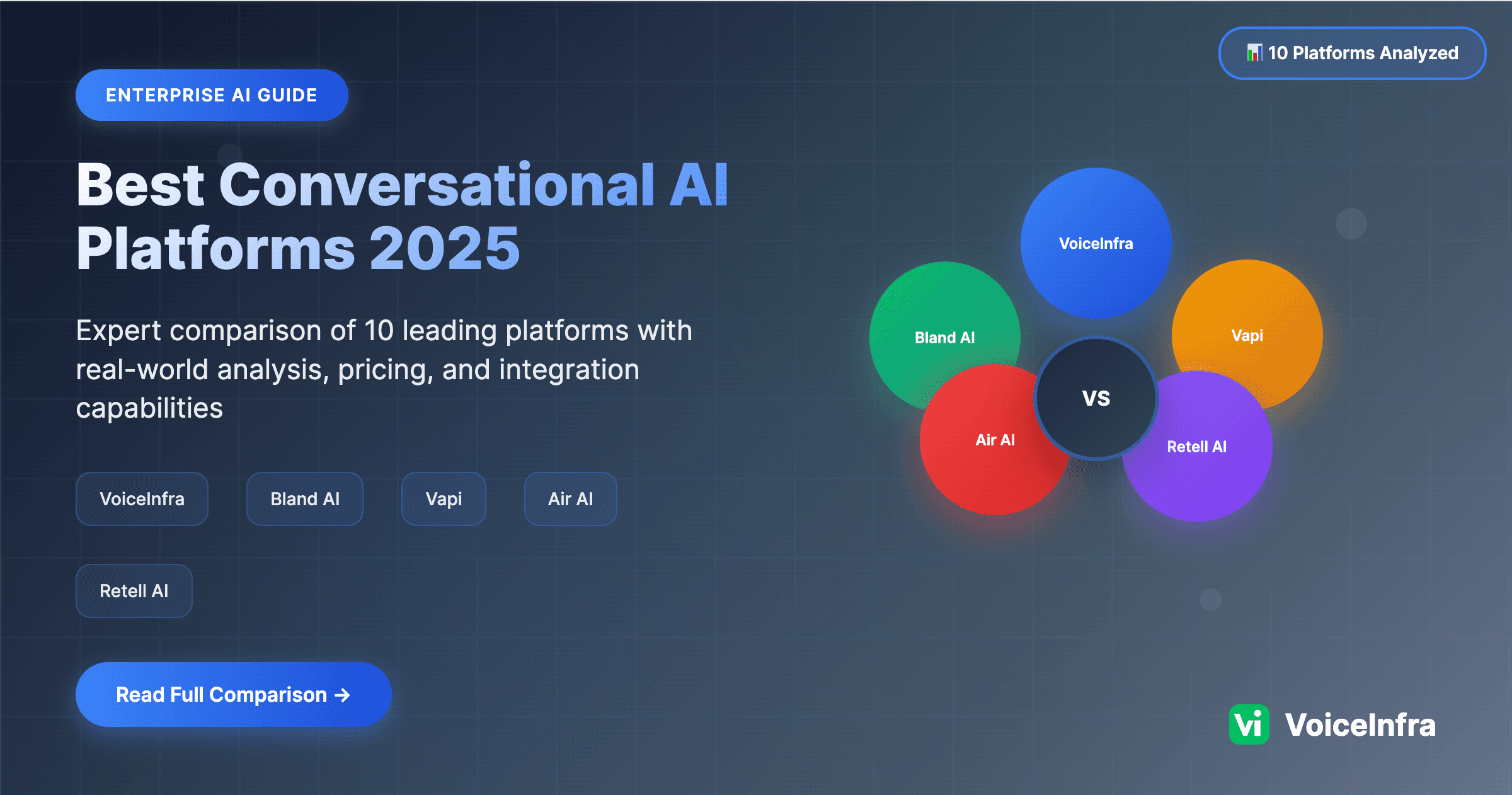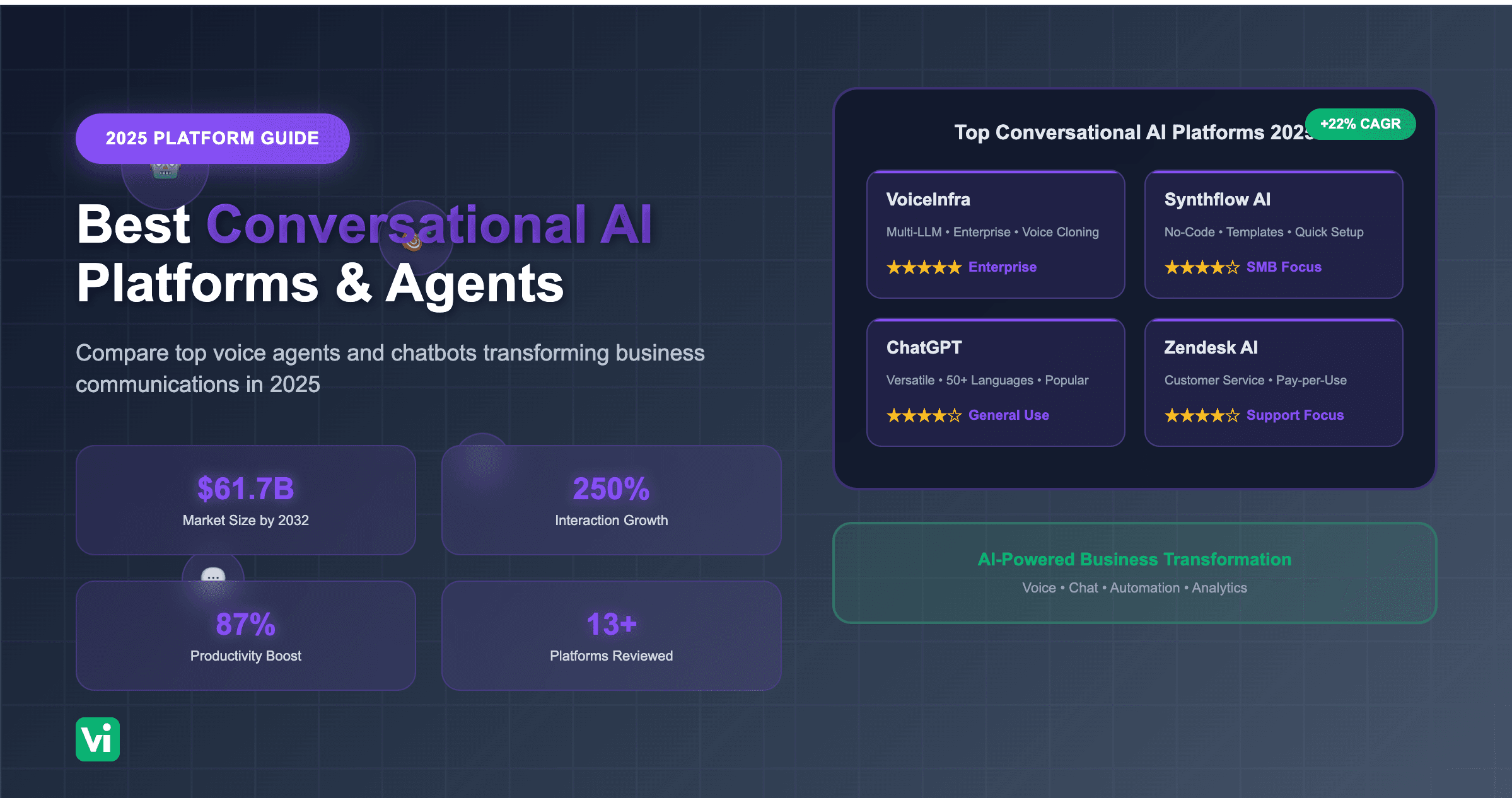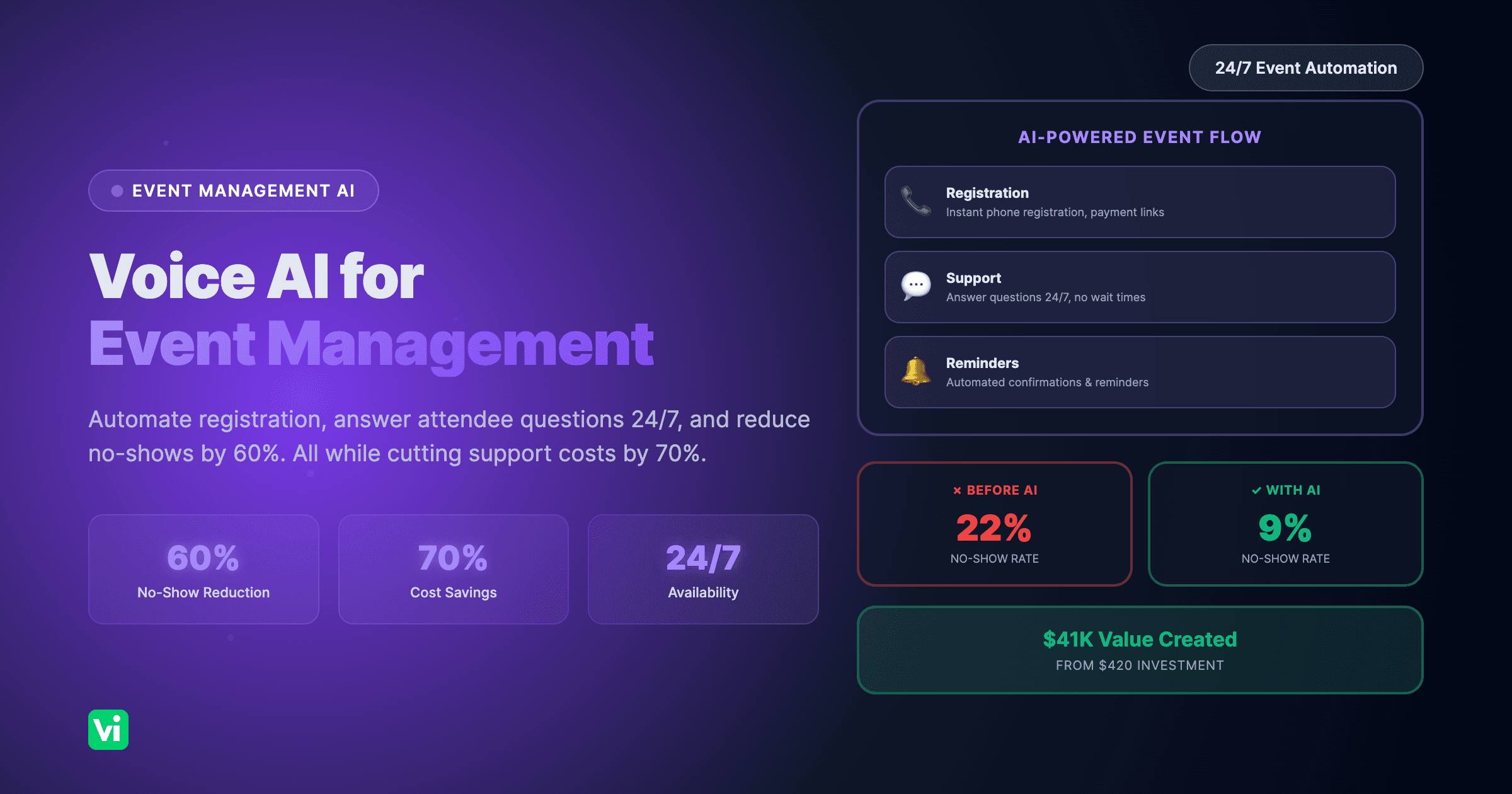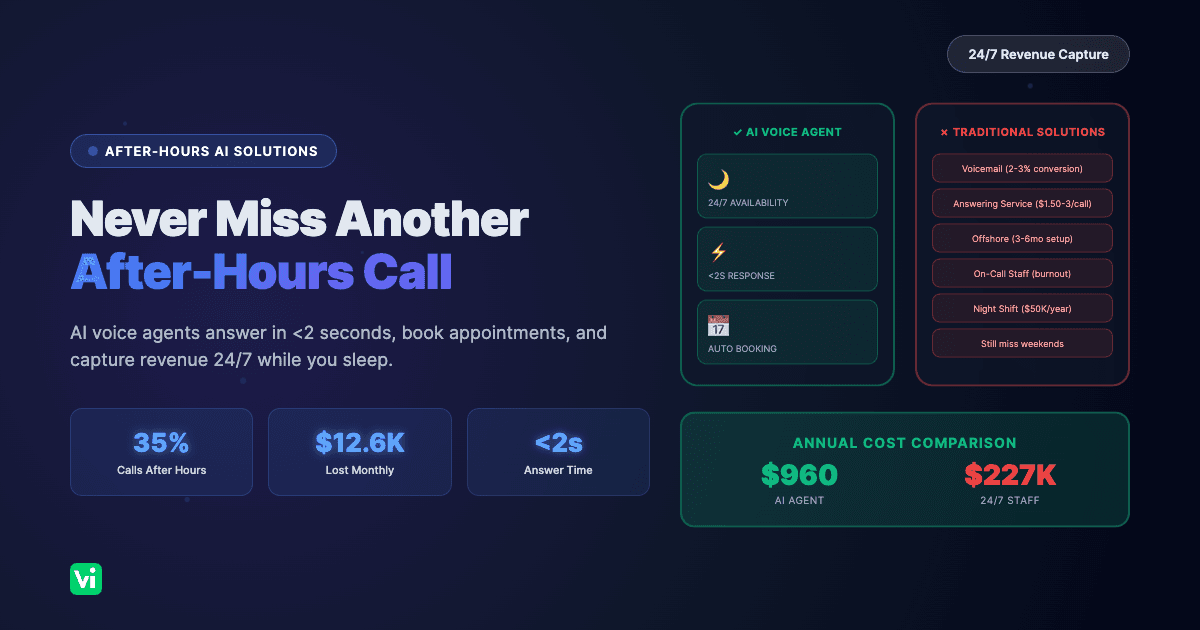The conversational AI market is exploding. From 2.41 billion in 2025 to a projected 10.07 billion by 2032, businesses are racing to implement AI-powered voice and chat solutions that can handle customer interactions 24/7.
But here's the challenge: Not all conversational AI platforms are created equal.
With dozens of vendors claiming to offer the "smartest" solution, choosing the right platform can feel overwhelming. Some excel at simple chatbots but fail at complex voice interactions. Others promise enterprise-grade features but deliver clunky interfaces that frustrate both agents and customers.
The stakes are high. Choose wrong, and you'll waste months of implementation time, thousands in licensing fees, and potentially damage customer relationships with poor AI experiences.
Choose right, and you'll unlock:
40-65% reduction in customer support costs
24/7 availability without overtime expenses
14% productivity increase for human agents
Instant response times under 2 seconds
Seamless escalation to human experts when needed
This comprehensive guide analyzes the top 10 conversational AI platforms dominating the enterprise market in 2025. We'll examine real user reviews, pricing models, integration capabilities, and technical specifications to help you make an informed decision.
What Makes a Conversational AI Platform Enterprise-Ready?
Before diving into specific platforms, let's establish the criteria that separate enterprise-grade solutions from basic chatbot builders.
Essential Enterprise Features
1. Multi-Channel Support
Voice calls (inbound and outbound)
Live chat and messaging
Social media integration
Email automation
WhatsApp Business connectivity
2. Advanced AI Capabilities
Natural language understanding (NLU)
Sentiment analysis and emotion detection
Context retention across conversations
Multi-language support (20+ languages)
Real-time learning and adaptation
3. Enterprise Integration
CRM connectivity (Salesforce, HubSpot, etc.)
Telephony system compatibility (SIP, PBX)
Knowledge base integration
API access for custom workflows
Single sign-on (SSO) support
4. Scalability & Reliability
99.9% uptime SLA
Concurrent call handling (1000+ simultaneous)
Auto-scaling infrastructure
Geographic redundancy
Enterprise-grade security
5. Analytics & Optimization
Real-time performance dashboards
Conversation analytics
Agent productivity metrics
Customer satisfaction tracking
A/B testing capabilities
The Hidden Costs of Poor Platform Selection
Implementation Delays: Basic platforms often require 3-6 months of custom development to meet the needs of enterprises. Advanced platforms like VoiceInfra deploy in under 60 seconds.
Integration Nightmares: Middleware solutions force you to manage multiple vendors, increasing latency and reducing reliability. End-to-end platforms eliminate these headaches.
Scalability Walls: Many platforms work fine for 100 calls but break down at enterprise volumes. Always test at your projected peak capacity.
Vendor Lock-in: Some platforms make it difficult to export data or switch providers. Look for open APIs and data portability guarantees.
Top 10 Conversational AI Platforms: Comprehensive Analysis
1. VoiceInfra - The Complete Enterprise Solution
Best For: Enterprises seeking end-to-end voice AI with ultra-low latency and enterprise-grade reliability
VoiceInfra stands out as the only platform building true infrastructure-level conversational AI with unmatched telephony integration. While competitors struggle with complex PBX configurations and telephony compatibility issues, VoiceInfra seamlessly integrates with any existing phone system in seconds.
Key Differentiators:
Seamless telephony integration: Works with any SIP-compatible system (3CX, Asterisk, Avaya, Mitel) without infrastructure changes
60-second deployment: Point your PBX to sip.voiceinfra.ai and go live instantly
Native phone system features: Call transfer, recording, and DTMF support built in
Bring-your-own-number support: Use your existing phone numbers with seamless integration
Multi-provider AI optimization: Access to 5+ LLM providers (OpenAI, Anthropic, Gemini, Groq)
Ultra-realistic voices: ElevenLabs, Cartesia, and Rime Labs integration
Enterprise reliability: 99.9% uptime SLA with redundant infrastructure
Pricing:
Pay-As-You-Go: $10 free credits to start, $0.05/minute platform fee plus provider costs
Enterprise: Custom pricing with unlimited calls and dedicated support
VoiceInfra's unique approach to making enterprise voice AI accessible to businesses of all sizes distinguishes it. The platform's PBX extension support means you can deploy AI agents as internal extensions without needing new phone numbers. At the same time, WhatsApp Business integration extends your reach to mobile-first customers globally.
Ideal Applications:
High-volume customer support operations requiring seamless telephony integration
Enterprise sales and lead qualification with CRM connectivity
Healthcare appointment scheduling with HIPAA compliance
Financial services customer care with enterprise security
Reseller and agency deployments with white-label capabilities
Multi-channel customer engagement (voice, WhatsApp, web chat)
2. Bland AI - Developer-Focused Infrastructure
Best For: Developers and enterprises needing customizable phone agent infrastructure
Bland AI positions itself as an API-first platform for developers building custom phone agent infrastructure. The platform emphasizes sub-second response times and programmable voice agents with extensive webhook integration capabilities.
Key Features:
API-first architecture with extensive webhook support
Live function calling and structured data extraction
Custom LLM fine-tuning capabilities
Multiple carrier integrations (Twilio, Vonage, BYOC)
Real-time conversation control and interruption handling
Pricing:
$0.09/minute for outbound calls
$0.04/minute for inbound calls
Additional costs for advanced features like voice cloning
Bland AI appeals to organizations with strong development teams who want to build custom phone agent infrastructure from the ground up. The platform requires significant technical expertise to implement and maintain, making it primarily suitable for companies with dedicated AI engineering resources.
3. Vapi AI - Middleware Flexibility
Best For: Organizations with existing AI models wanting middleware connectivity
Vapi operates as a middleware layer that combines speech-to-text, large language model processing, and text-to-speech into a unified pipeline. The platform supports bring-your-own-model architecture with custom API keys across all layers.
Key Features:
Real-time voice orchestration with sub-500ms latency
Flow Studio visual builder for conversation design
Multi-model AI support (OpenAI, Claude, Deepgram, ElevenLabs)
Tool calling and webhook routing capabilities
Agent chaining (Squads) for complex workflows
100+ language support for global deployment
Pricing:
$0.05/minute platform orchestration fee
Additional costs for STT (0.008 − 0.017/min), LLM (0.005 − 0.03/min), TTS (0.001 − 0.65/min)
Total effective cost ranges from 0.07 − 0.25/minute
Vapi's middleware approach offers extensive flexibility for organizations that want to use their preferred AI models, but requires technical expertise to configure and optimize the multi-vendor stack. The modular pricing can become complex to manage across different provider relationships.
4. Air AI - Enterprise Voice Automation
Best For: Large enterprises with high-volume calling operations
Air AI positions itself as a voice-first conversational AI platform designed to handle entire phone conversations with human-like naturalness. The platform emphasizes long-form conversations (up to 40+ minutes) and comprehensive automation capabilities.
Key Features:
Human-like voice conversations with natural pacing and emphasis
24/7 call coverage with perfect memory retention
Integration with 5,000+ tools, including Salesforce and HubSpot
Automated post-call actions (CRM updates, follow-ups, scheduling)
Advanced conversation handling for complex scenarios
Pricing:
High upfront license fee: 25,000 − 100,000 (one-time)
Usage-based: 0.11/minute outbound, 0.32/minute inbound
Additional charges for ringing time and premium features
Air AI targets enterprise-level operations with sophisticated voice automation needs. The platform requires a significant upfront investment and is designed for organizations that handle thousands of calls monthly, with dedicated technical resources for implementation and maintenance.
5. Retell AI - Developer-Focused Voice Platform
Best For: Companies wanting production-ready voice agents with developer control
Retell AI provides a comprehensive platform for building, testing, deploying, and monitoring AI voice agents at scale. The platform emphasizes enterprise-grade reliability with 99.99% uptime and sub-500ms latency.
Key Features:
Auto-sync knowledge base with real-time updates
Warm call transfer with handoff messages
Native Cal.com integration for appointment booking
IVR navigation with DTMF digit pressing
Batch calling campaigns without concurrency limits
Verified phone numbers and branded caller ID
SIP trunking with major telephony providers (Twilio, Vonage, Telnyx)
Multilingual support (18+ languages)
SOC 2, HIPAA, and GDPR compliance
Pricing:
$0.07/minute pay-as-you-go model
No platform fees or subscription costs
$10 free credits for new users
Enterprise plans with reduced rates and premium support
Retell AI focuses on production-ready deployment with enterprise-grade features and compliance. The platform offers transparent pricing and comprehensive monitoring tools, making it suitable for businesses that need reliable voice automation without complex vendor management.
6. Synthflow - Visual Conversation Builder
Best For: Marketing teams and agencies needing visual workflow design
Synthflow focuses on visual conversation design with drag-and-drop interfaces for creating AI voice agents.
Key Features:
Visual workflow builder
Marketing automation integration
Lead qualification focus
Agency-friendly features
Pricing:
Subscription-based pricing
Agency and white-label options
Synthflow's visual workflow builder makes it accessible to marketing teams without technical backgrounds. The platform primarily focuses on marketing automation and lead generation, rather than comprehensive enterprise voice solutions.
7. Thoughtly - Conversational Intelligence
Best For: Businesses focusing on conversation analytics and insights
Thoughtly emphasizes conversation intelligence and analytics alongside basic AI agent capabilities.
Key Features:
Advanced conversation analytics
Sentiment analysis
Performance insights
Integration capabilities
Pricing:
Tiered subscription model
Analytics-focused pricing
Thoughtly specializes in conversation analytics and insights, making it valuable for businesses primarily interested in understanding their customer interactions. However, its AI agent capabilities are more basic compared to platforms focused on automation and voice quality.
8. Trillet AI - Emerging Voice Platform
Best For: Early adopters willing to work with newer technology
Trillet AI is a newer entrant focusing on voice-first conversational experiences.
Key Features:
Voice-first design
Modern AI models
Competitive pricing
Growing feature set
Pricing:
Competitive usage-based pricing
Early adopter discounts
Trillet AI represents the next generation of voice-first platforms, leveraging modern technology. As an emerging player, it's still building out enterprise features and support infrastructure that established businesses typically require.
9. IBM Watson Assistant - Enterprise Legacy
Best For: Large enterprises already invested in the IBM ecosystem
IBM Watson Assistant brings enterprise-grade features with strong integration into IBM's broader AI portfolio.
Key Features:
Enterprise security and compliance
IBM ecosystem integration
Advanced NLP capabilities
Global support organization
Pricing:
Enterprise licensing model
Custom pricing for large deployments
IBM Watson Assistant offers enterprise-grade security and global support, making it an attractive option for large organizations already invested in IBM's ecosystem. However, the platform requires significant setup time and investment, with voice capabilities being more limited compared to specialized voice AI platforms.
10. Microsoft Bot Framework - Developer Platform
Best For: Microsoft-centric organizations with strong development teams
Microsoft's Bot Framework provides comprehensive tools for building conversational AI within the Microsoft ecosystem.
Key Features:
Deep Microsoft integration
Comprehensive development tools
Azure cloud integration
Enterprise security
Pricing:
Azure consumption-based pricing
Enterprise agreements available
Microsoft Bot Framework provides comprehensive development tools for organizations deeply integrated with Microsoft's ecosystem. The platform requires substantial development resources and is primarily designed for text-based interactions rather than voice-first applications.
How to Choose the Right Conversational AI Platform: Decision Framework
Step 1: Define Your Use Case Requirements
Customer Support Automation
Essential features: Multi-channel support, CRM integration, escalation workflows
Consider: Agent handoff capabilities, knowledge base integration, analytics
Evaluate: Platform's track record with similar support volumes
Sales and Lead Qualification
Essential features: Real-time data access, appointment scheduling, pipeline integration
Consider: Conversation intelligence, lead scoring, follow-up automation
Evaluate: Integration depth with your existing sales tools
Voice-First Applications
Essential features: Natural voice synthesis, telephony integration, call handling
Consider: Voice quality, response speed, phone system compatibility
Evaluate: Support for your specific telephony infrastructure
Step 2: Evaluate Technical Requirements
Integration Complexity
Simple (Plug-and-play): VoiceInfra, Air AI
Moderate (Some configuration): Bland AI, IBM Watson
Complex (Significant development): Vapi, Retell, Microsoft Bot Framework
Scalability Needs
High Volume (1000+ concurrent): VoiceInfra, Vapi, Bland AI, IBM Watson
Medium Volume (100-1000 concurrent): Most platforms
Low Volume (<100 concurrent): Any platform
Performance Requirements
Define acceptable response times for your use case
Consider peak usage periods and concurrent user needs
Evaluate uptime requirements and disaster recovery needs
Step 3: Assess Total Cost of Ownership
Hidden Costs to Consider:
Implementation and setup fees
Training and onboarding costs
Integration development time
Ongoing maintenance and support
Provider switching costs
Cost Comparison (Per Minute)
VoiceInfra: $0.10-0.20 (all-inclusive)
Bland AI: $0.10-0.30 (infrastructure included)
Vapi/Retell: $0.20-0.40 (multiple providers)
Enterprise Platforms: Custom pricing (often higher)
Step 4: Evaluate Vendor Stability and Support
Key Questions to Ask:
How long has the vendor been in business?
What's their funding situation and growth trajectory?
Do they offer 24/7 support for your time zone?
What's their average response time for critical issues?
Do they provide dedicated customer success management?
Support Quality Rankings:
VoiceInfra: 24/7 technical support, dedicated onboarding
IBM Watson: Global enterprise support organization
Microsoft: Comprehensive Azure support ecosystem
Bland AI: Strong developer community and documentation
Others: Varies significantly
Step 5: Plan Your Implementation Strategy
Phase 1: Pilot Program (Weeks 1-4)
Start with a low-risk use case
Test with a limited user group
Measure key performance metrics
Gather user feedback
Phase 2: Gradual Rollout (Weeks 5-12)
Expand to additional use cases
Scale the user base gradually
Optimize based on real usage data
Train support teams
Phase 3: Full Deployment (Weeks 13+)
Deploy across all intended channels
Implement advanced features
Establish ongoing optimization processes
Plan for future enhancements
Why VoiceInfra Leads the Enterprise Market
After analyzing all major platforms, VoiceInfra emerges as the clear leader for enterprise conversational AI. Here's why:
Unique Competitive Advantages
1. Unmatched Telephony Integration VoiceInfra is the only platform built specifically for seamless telephony integration:
Works with any SIP-compatible PBX (3CX, Asterisk, Avaya, Mitel) without modifications
Native support for call transfer, recording, and DTMF
Bring-your-own-number support with seamless integration
Advanced call routing and PBX extension deployment
No telephony expertise required for deployment
2. True Infrastructure Ownership Unlike middleware solutions that cobble together external APIs, VoiceInfra owns the entire stack:
No external dependencies or third-party failures
Consistent performance at any scale
Better cost control and predictability
Single vendor accountability
3. Most Cost-Effective Enterprise Solution VoiceInfra delivers enterprise features at the industry's most competitive pricing:
Transparent pay-as-you-go model starting at $0.05/minute platform fee
Direct provider pricing for STT, LLM, and TTS (no markup)
Multi-provider flexibility like Vapi, but with better telephony integration
Enterprise plans are significantly cheaper than traditional solutions
Fastest ROI in the industry
4. Instant Enterprise Deployment While competitors require weeks or months of setup, VoiceInfra deploys in 60 seconds:
Point your PBX to sip.voiceinfra.ai
Configure your agents through the web interface
Go live immediately with zero infrastructure changes
No IT resources required for implementation
5. Enterprise-Grade Reliability Built for mission-critical applications:
99.9% uptime SLA with redundant infrastructure
Global deployment across multiple regions
Enterprise security and compliance (HIPAA, SOC-2)
24/7 monitoring and support
Real-World Success Stories
Dental Practice with 3 Locations
Challenge: The receptionist was constantly interrupted during patient care to answer booking calls
Solution: VoiceInfra handles appointment scheduling, cancellations, and basic questions
Results: The receptionist can focus on in-person patients, 40% more appointments booked after hours
Local HVAC Company
Challenge: Missing emergency service calls during the busy season, losing customers to competitors
Solution: VoiceInfra answers all calls 24/7, schedules appointments, and dispatches urgent requests
Results: Never miss a call again, 30% increase in emergency bookings, happier customers
Small Law Firm
Challenge: Potential clients hang up when calls go to voicemail during court hours
Solution: VoiceInfra provides professional reception, schedules consultations, and qualifies leads
Results: Professional image maintained, 50% more consultation bookings, no more missed opportunities
Making Your Decision: Key Takeaways
Choose VoiceInfra If You Need:
✅ Seamless telephony integration with any existing phone system
✅ Fastest deployment (60 seconds vs. weeks/months)
✅ Most cost-effective enterprise solution in the market
✅ Enterprise reliability with 99.9% uptime SLA
✅ Complete solution without vendor management complexity
Consider Alternatives If:
You have extensive in-house AI development capabilities (Bland AI)
You're already heavily invested in the IBM ecosystem (Watson)
You need basic chatbots only (simpler platforms)
Budget is minimal (though VoiceInfra's ROI often justifies costs)
Red Flags to Avoid:
❌ Platforms requiring 6+ month implementations
❌ Middleware solutions with multiple vendor dependencies
❌ Providers with poor customer service reviews
❌ Platforms without clear enterprise roadmaps
❌ Solutions requiring extensive telephony modifications
The Future of Conversational AI: What's Coming in 2025
Multimodal Interactions Expect platforms to integrate voice, video, and screen sharing for richer customer experiences. VoiceInfra is already developing these capabilities.
Advanced Emotional Intelligence AI agents will better understand and respond to customer emotions, creating more empathetic interactions.
Industry-specific solutions Platforms will offer pre-built solutions for healthcare, finance, retail, and other verticals, with a focus on compliance and workflow optimization.
Autonomous Problem Resolution AI agents will handle increasingly complex issues without human intervention, including multi-step troubleshooting and account modifications.
Ready to Transform Your Customer Experience?
The conversational AI revolution is here, and the companies that act now will gain a significant competitive advantage. While the market offers many options, VoiceInfra's combination of seamless telephony integration, instant deployment, and industry-leading cost-effectiveness makes it the clear choice for businesses serious about AI-powered customer engagement.
Don't let another day pass with:
Missed calls are costing you revenue
Customers waiting on hold
Support costs are spiraling out of control
Competitors gaining AI advantages
Start your VoiceInfra journey today:
Get Started Free → - $10 free credits, no credit card required
Schedule Enterprise Demo → - See VoiceInfra in action with your use case
Talk to Sales → - Custom enterprise solutions and pricing
VoiceInfra's AI voice agents are designed to work alongside your human team, handling routine inquiries while seamlessly escalating complex issues to your skilled agents with full context. Our platform enhances human capabilities rather than replacing them, creating a more efficient and satisfying experience for everyone.
Frequently Asked Questions
What is the best conversational AI platform for enterprise use?
VoiceInfra leads the enterprise market due to its unmatched telephony integration, 60-second deployment, and comprehensive feature set. Unlike middleware solutions that require managing multiple vendors, VoiceInfra provides an end-to-end platform with enterprise-grade reliability, transparent pricing, and seamless PBX integration with any existing phone system.
Can conversational AI integrate with existing phone systems?
Yes, but integration complexity varies dramatically. VoiceInfra is built explicitly for seamless telephony integration, working with any SIP-compatible PBX (3CX, Asterisk, Avaya, Mitel) in 60 seconds without infrastructure changes. Most other platforms treat telephony as an afterthought, requiring complex workarounds and additional vendor relationships.
What's the difference between conversational AI and chatbots?
Conversational AI platforms, such as VoiceInfra, handle natural voice conversations with advanced understanding, context retention, and multi-turn dialogues. Traditional chatbots typically handle simple text-based interactions with limited knowledge. Modern conversational AI can manage complex customer inquiries, integrate with business systems, and seamlessly escalate to human agents when needed.
How quickly can I deploy conversational AI for my business?
Deployment speed varies from 60 seconds to 6+ months, depending on the platform. VoiceInfra deploys instantly by simply pointing your PBX to sip.voiceinfra.ai. Middleware platforms typically require 2-6 months for setup and integration, while enterprise platforms often need 6+ months for full deployment, including custom development and testing.
Which conversational AI platform works best with small businesses?
VoiceInfra is ideal for small businesses due to its pay-as-you-go pricing model, instant deployment, and no technical expertise requirements. Small businesses can start with $10 free credits and scale usage based on actual needs, avoiding the high upfront costs and complex implementations required by enterprise-focused platforms.
Do conversational AI platforms support multiple languages?
Most modern platforms offer multi-language support, but capabilities vary. VoiceInfra supports 100+ languages with native voice synthesis, while platforms like Vapi and Bland AI provide extensive language support through their provider integrations. Consider your specific language requirements and voice quality needs when evaluating platforms.
What security features should I look for in conversational AI?
Enterprise conversational AI should incorporate data encryption in transit and at rest, as well as compliance certifications (such as HIPAA, SOC-2, and GDPR), access controls, audit logging, and geographic data residency options. VoiceInfra provides enterprise-grade security as standard, while many competitors require additional configuration or fail to meet enterprise standards.
Can conversational AI handle complex customer service issues?
Modern AI platforms can autonomously handle 70-80% of customer inquiries, including account lookups, appointment scheduling, product information, and troubleshooting. For complex issues requiring human judgment, platforms like VoiceInfra provide smart escalation with complete context transfer, ensuring seamless handoffs while maintaining service quality.
How do I choose between Vapi, Bland AI, and VoiceInfra?
Choose based on your technical requirements and use case: VoiceInfra for seamless telephony integration and instant deployment; Vapi for middleware flexibility with existing AI models; Bland AI for custom development projects. VoiceInfra offers the most comprehensive solution for businesses prioritizing ease of use, telephony integration, and enterprise reliability.



